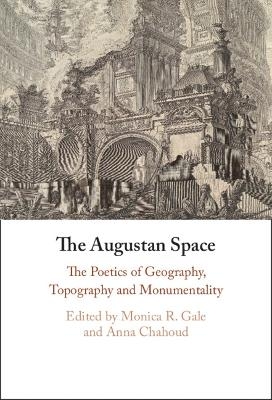
The Augustan Space
Cambridge University Press (Verlag)
978-1-009-17607-1 (ISBN)
Augustus famously boasted that, having inherited a city of brick, he bequeathed a city of marble; but the transformation of the City's physical fabric is only one aspect of a pervasive concern with geography, topography and monumentality that dominates Augustan culture and – in particular – Augustan poetry and poetics. Contributors to the present volume bring a range of approaches to bear on the works of Horace, Virgil, Propertius and Ovid, and explore their construction and representation of Greek, Roman and imperial space; centre and periphery; relations between written monuments and the physical City; movement within, beyond and away from Rome; gendered and heterotopic spaces; and Rome itself, as caput mundi, as cosmopolis and as 'heavenly city'. The introduction considers the wider cultural importance of space and monumentality in first-century Rome, and situates the volume's key themes within the context of the spatial turn in Classical Studies.
MONICA R. GALE is a Professor in Classics at Trinity College Dublin. She is the author of Myth and Poetry in Lucretius (Cambridge, 1994), Virgil on the Nature of Things: The Georgics, Lucretius and the Didactic Tradition (Cambridge, 2000), Lucretius: De Rerum Natura V (2009) and other books and articles on late Republican and Augustan Poetry. She is editor of Classics journal Hermathena. ANNA CHAHOUD is Professor of Latin at Trinity College Dublin. She is the author of C. Lucili Reliquiarum concordantiae (1998) and of articles on Republican Latin and the Latin language. She also contributed to and edited, with E. Dickey, Colloquial and Literary Latin (Cambridge, 2010) and, with J. N. Adams and G. Pezzini, Early Latin: Constructs, Diversity, Reception (Cambridge, 2023).
Introduction: the spaces of Augustan poetry Monica R. Gale; 1. The city in Horace's Sermo: physical spaces and political spaces Sandra Citroni Marchetti; 2. excucurristi a Neapoli: Virgil, Augustus and the art of disappearing Melanie Möller; 3. Poetic and Imperial spaces in Propertius, Books 1–3 Monica R. Gale; 4. Horace on sacred space: the Odes and Augustan temples Stephen Harrison; 5. Roman topography, politics and gender: the cult of Bona Dea in Propertius 4.9: An answer to Aeneid 8? Jacqueline Fabre-Serris; 6. aurea nunc, olim siluestribus horrida dumis: the luci Molorci and the Augustan space in Virgil's Georgics and Aeneid 8 Florence Klein; 7. Hippolytus and Egeria in the woods of Aricia (Virgil, Aen. 7.761–82 and Ovid, Met. 15.479–551): where Greek myth and Italic myth come together Laura Aresi 8. locum tua tempora poscunt: topography in Ovid's Fasti S. J. Heyworth; 9. imperii Roma deumque locus: Rome as celestial city Gianpiero Rosati; 10. The rise and fall of Virgil's sublime carthage Siobhan Chomse; 11. Eccentric poetry: Ovid, exile and the prototype of a 'periphery' literature Marco Fucecchi; 12. Virgilian heterotopias: multiple entrances to the underworld Giovanna Laterza; 13. loci desperati: possibilities and boundaries of Augustan conceptions of space Jürgen Paul Schwindt.
| Erscheinungsdatum | 22.08.2024 |
|---|---|
| Zusatzinfo | Worked examples or Exercises |
| Verlagsort | Cambridge |
| Sprache | englisch |
| Maße | 152 x 229 mm |
| Gewicht | 564 g |
| Themenwelt | Literatur ► Klassiker / Moderne Klassiker |
| Geisteswissenschaften ► Sprach- / Literaturwissenschaft ► Anglistik / Amerikanistik | |
| Geisteswissenschaften ► Sprach- / Literaturwissenschaft ► Literaturwissenschaft | |
| ISBN-10 | 1-009-17607-2 / 1009176072 |
| ISBN-13 | 978-1-009-17607-1 / 9781009176071 |
| Zustand | Neuware |
| Informationen gemäß Produktsicherheitsverordnung (GPSR) | |
| Haben Sie eine Frage zum Produkt? |
aus dem Bereich


